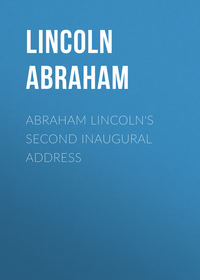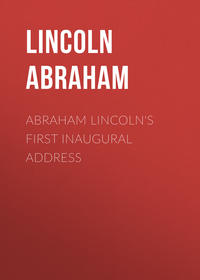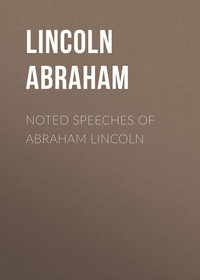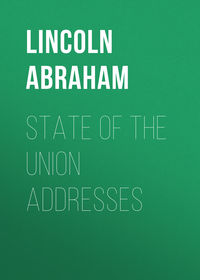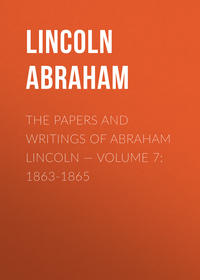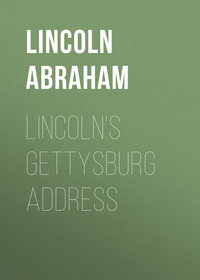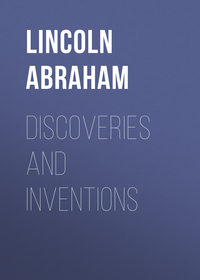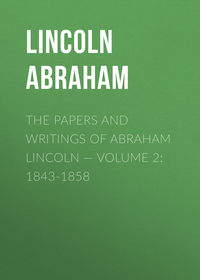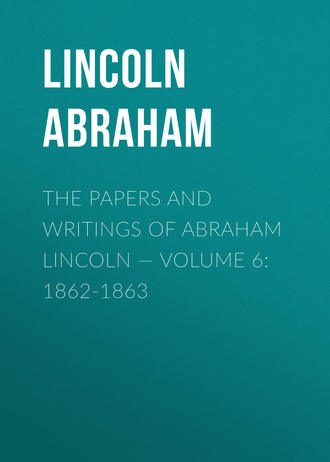 полная версия
полная версияThe Papers And Writings Of Abraham Lincoln — Volume 6: 1862-1863
And the Executive will in due time recommend that all citizens of the United States who shall have remained loyal thereto throughout the rebellion shall (upon the restoration of the constitutional relation between the United States and their respective States and people, if that relation shall have been suspended or disturbed) be compensated for all losses by acts of the United States, including the loss of slaves.
In witness whereof, I have hereunto set my hand and caused the seal of the United States to be affixed.
Done at the City of Washington, this twenty-second day of September, in the year of our Lord one thousand eight hundred and sixty-two, and of the independence of the United States the eighty-seventh.
A. LINCOLN.
By the President: WILLIAM H. SEWARD, Secretary of State.
PROCLAMATION SUSPENDING THE WRIT OF HABEAS CORPUS,
SEPTEMBER 24, 1862THE PRESIDENT OF THE UNITED STATES OF AMERICA
A Proclamation
Whereas it has become necessary to call into service not only volunteers, but also portions of the militia of the States by draft, in order to suppress the insurrection existing in the United States, and disloyal persons are not adequately restrained by the ordinary processes of law from hindering this measure, and from giving aid and comfort in various ways to the insurrection:
Now, therefore, be it ordered
First. That during the existing insurrection, and as a necessary measure for suppressing the same, all rebels and insurgents, their aiders and abettors within the United States, and all persons discouraging volunteer enlistments, resisting militia drafts, or guilty of any disloyal practice affording aid and comfort to rebels against the authority of the United States, shall be subject to martial law, and liable to trial and punishment by courts-martial or military commissions.
Second. That the writ of habeas corpus is suspended in respect to all persons arrested, or who are now, or hereafter during the rebellion shall be, imprisoned in any fort camp, arsenal, military prison or other place of confinement by any military authority or by the sentence of any court-martial or military commission.
In witness whereof I have hereunto set my hand and caused the seal of the United States to be affixed.
Done at the city of WASHINGTON, this twenty-fourth day of September. A.D. eighteen hundred and sixty-two, and of the independence of the United States the eighty-seventh.
A. LINCOLN.
By the President: WILLIAM H. SEWARD, Secretary of State.
REPLY TO SERENADE, SEPTEMBER 24, 1862
I appear before you to do little more than acknowledge the courtesy you pay me, and to thank you for it. I have not been distinctly informed why it is that on this occasion you appear to do me this honor, though I suppose it is because of the proclamation. What I did, I did after a very full deliberation, and under a very heavy and solemn sense of responsibility. I can only trust in God I have made no mistake. I shall make no attempt on this occasion to sustain what I have done or said by any comment. It is now for the country and the world to pass judgment and, maybe, take action upon it.
I will say no more upon this subject. In my position I am environed with difficulties. Yet they are scarcely so great as the difficulties of those who upon the battle-field are endeavoring to purchase with their blood and their lives the future happiness and prosperity of this country. Let us never forget them. On the fourteenth and seventeenth days of this present month there have been battles bravely, skillfully, and successfully fought. We do not yet know the particulars. Let us be sure that, in giving praise to certain individuals, we do no injustice to others. I only ask you, at the conclusion of these few remarks, to give three hearty cheers for all good and brave officers and men who fought those successful battles.
RECORD EXPLAINING THE DISMISSAL OF MAJOR JOHN J. KEY
FROM THE MILITARY SERVICE OF THE UNITED STATESEXECUTIVE MANSION, WASHINGTON,
September 26, 1862.
MAJOR JOHN J. KEY:
I am informed that, in answer to the question, "Why was not the rebel army bagged immediately after the battle near Sharpsburg?" propounded to you by Major Levi C. Turner, Judge Advocate, etc., you said: "That is not the game. The object is, that neither army shall get much advantage of the other; that both shall be kept in the field till they are exhausted, when we will make a compromise and save slavery."
I shall be very happy if you will, within twenty-four hours from the receipt of this, prove to me by Major Turner that you did not, either literally or in substance, make the answer stated.
[Above delivered to Major Key at 10.25 a.m. September 27th.]
At about 11 o'clock A.M., September 27, 1862, Major Key and Major Turner appeared before me. Major Turner says:
"As I remember it, the conversation was: 'Why did we not bag them after the battle of Sharpsburg?' Major Key's reply was: 'That was not the game; that we should tire the rebels out and ourselves; that that was the only way the Union could be preserved, we come together fraternally, and slavery be saved.'"
On cross-examination, Major Turner says he has frequently heard Major Key converse in regard to the present troubles, and never heard him utter a sentiment unfavorable to the maintenance of the Union. He has never uttered anything which he, Major T., would call disloyalty. The particular conversation detailed was a private one.
[Indorsement on the above.]
In my view, it is wholly inadmissible for any gentleman holding a military commission from the United States to utter such sentiments as Major Key is within proved to have done. Therefore, let Major John J. Key be forthwith dismissed from the military service of the United States.
A. LINCOLN.
TO HANNIBAL HAMLIN
(Strictly private.)EXECUTIVE MANSION, WASHINGTON,
September 28, 1862.
HON. HANNIBAL HAMLIN.
MY DEAR SIR: Your kind letter of the 25th is just received. It is known to some that, while I hope something from the proclamation, my expectations are not as sanguine as are those of some friends. The time for its effect southward has not come; but northward the effect should be instantaneous. It is six days old, and, while commendation in newspapers and by distinguished individuals is all that a vain man could wish, the stocks have declined, and troops come forward more slowly than ever. This, looked soberly in the face, is not very satisfactory. We have fewer troops in the field at the end of the six days than we had at the beginning — the attrition among the old outnumbering the addition by the new. The North responds to the proclamation sufficiently in breath; but breath alone kills no rebels.
I wish I could write more cheerfully; nor do I thank you the less for the kindness of your letter.
Yours very truly,
A. LINCOLN.
TO GENERAL HALLECK
McCLELLAN'S HEADQUARTERS, October 3, 1862MAJOR-GENERAL HALLECK:
General Stuart, of the rebel army, has sent in a few of our prisoners under a flag of truce, paroled with terms to prevent their fighting the Indians, and evidently seeking to commit us to their right to parole prisoners in that way. My inclination is to send the prisoners back with a definite notice that we will recognize no paroles given to our prisoners by the rebels as extending beyond a prohibition against fighting them, though I wish your opinion upon it, based both upon the general law and our cartel. I wish to avoid violations of the law and bad faith. Answer as quickly as possible, as the thing, if done at all, should be done at once.
A. LINCOLN, President
REMARKS TO THE ARMY OF THE POTOMAC AT FREDERICK, MARYLAND,
OCTOBER, 4, 1862I am surrounded by soldiers and a little farther off by the citizens of this good City of Frederick. Nevertheless I can only say, as I did five minutes ago, it is not proper for me to make speeches in my present position. I return thanks to our soldiers for the good services they have rendered, the energy they have shown, the hardships they have endured, and the blood they have shed for this Union of ours; and I also return thanks, not only to the soldiers, but to the good citizens of Frederick, and to the good men, women, and children in this land of ours, for their devotion to this glorious cause; and I say this with no malice in my heart towards those who have done otherwise. May our children and children's children, for a thousand generations, continue to enjoy the benefits conferred upon us by a united country, and have cause yet to rejoice under these glorious institutions, bequeathed to us by WASHINGTON and his compeers. Now, my friends, soldiers and citizens, I can only say once more-farewell.
TELEGRAM FROM GENERAL HALLECK
TO GENERAL G. B. McCLELLAN., WASHINGTON, D. C., October 6, 1862MAJOR-GENERAL McCLELLAN:
I am instructed to telegraph you as follows: The President directs that you cross the Potomac and give battle to the enemy, or drive him south. Your army must move now, while the roads are good. If you cross the river between the enemy and Washington, and cover the latter by your operation, you can be reinforced by thirty thousand men. If you move up the valley of the Shenandoah, not more than twelve or fifteen thousand can be sent you. The President advises the interior line between Washington and the enemy, but does not order it. He is very desirous that your army move as soon as possible. You will immediately report what line you adopt, and when you intend to cross the river; also to what point the reinforcements are to be sent. It is necessary that the plan of your operations be positively determined on, before orders are given for building bridges and repairing railroads. I am directed to add that the Secretary of War and the General-in-chief fully concur with the President in these directions.
H. W. HALLECK, General-in-Chief.
TELEGRAM TO GENERAL McCLELLAN
EXECUTIVE MANSION, WASHINGTON, October 7, 1862MAJOR-GENERAL McCLELLAN, Hdqs. Army of the Potomac:
You wish to see your family and I wish to oblige you. It might be left to your own discretion; certainly so, if Mrs. M. could meet you here at Washington.
A. LINCOLN.
TO T. H. CLAY
WAR DEPARTMENT, October 8, 1862THOMAS H. CLAY, Cincinnati, Ohio:
You cannot have reflected seriously when you ask that I shall order General Morgan's command to Kentucky as a favor because they have marched from Cumberland Gap. The precedent established by it would evidently break up the whole army. Buell's old troops, now in pursuit of Bragg, have done more hard marching recently; and, in fact, if you include marching and fighting, there are scarcely any old troops east or west of the mountains that have not done as hard service. I sincerely wish war was an easier and pleasanter business than it is; but it does not admit of holidays. On Morgan's command, where it is now sent, as I understand, depends the question whether the enemy will get to the Ohio River in another place.
A. LINCOLN.
TELEGRAM TO GENERAL U. S. GRANT
WASHINGTON, D.C., October 8, 1862MAJOR-GENERAL GRANT:
I congratulate you and all concerned in your recent battles and victories. How does it all sum up? I especially regret the death of General Hackleman, and am very anxious to know the condition of General Oglesby, who is an intimate personal friend.
A. LINCOLN.
TELEGRAM TO GENERAL J. T. BOYLE
WAR DEPARTMENT, October 11,1862. 4 P.MGENERAL BOYLE, Louisville, Kentucky:
Please send any news you have from General Buell to-day.
A. LINCOLN.
TELEGRAM TO GENERAL J. T. BOYLE
WAR DEPARTMENT, October 12, 1862. 4.10 P.MGENERAL BOYLE, Louisville, Kentucky:
We are anxious to hear from General Buell's army. We have heard nothing since day before yesterday. Have you anything?
A. LINCOLN.
TELEGRAM TO GENERAL CURTIS
WASHINGTON, D. C., October 12, 1862MAJOR-GENERAL CURTIS, Saint Louis, Missouri:
Would the completion of the railroad some distance further in the direction of Springfield, Mo., be of any military advantage to you? Please answer.
A. LINCOLN.
TO GENERAL G. B. McCLELLAN
EXECUTIVE MANSION, WASHINGTON, October 13, 1862MY DEAR SIR — You remember my speaking to you of what I called your over-cautiousness. Are you not over-cautious when you assume that you cannot do what the enemy is constantly doing? Should you not claim to be at least his equal in prowess, and act upon the claim?
As I understand, you telegraphed General Halleck that you cannot subsist your army at Winchester unless the railroad from Harper's Ferry to that point be put in working order. But the enemy does now subsist his army at Winchester, at a distance nearly twice as great from railroad transportation as you would have to do, without the railroad last named. He now wagons from Culpepper Court-House, which is just about twice as far as you would have to do from Harper's Ferry. He is certainly not more than half as well provided with wagons as you are. I certainly should be pleased for you to have the advantage of the railroad from Harper's Perry to Winchester; but it wastes an the remainder of autumn to give it to you, and, in fact, ignores the question of time, which cannot and must not be ignored.
Again, one of the standard maxims of war, as you know, is "to operate upon the enemy's communications as much as possible, without exposing your own." You seem to act as if this applies against you, but cannot apply in your favor. Change positions with the enemy, and think you not he would break your communication with Richmond within the next twenty-four hours? You dread his going into Pennsylvania. But if he does so in full force, he gives up his communications to you absolutely, and you have nothing to do but to follow and ruin him; if he does so with less than full force, fall upon and beat what is left behind all the easier.
Exclusive of the water line, you are now nearer to Richmond than the enemy is, by the route that you can and he must take. Why can you not reach there before him, unless you admit that he is more than your equal on a march? His route is the arc of a circle, while yours is the chord. The roads are as good on yours as on his.
You know I desired, but did not order, you to cross the Potomac below instead of above the Shenandoah and Blue Ridge. My idea was, that this would at once menace the enemy's communications, which I would seize if he would permit. If he should move northward, I would follow him closely, holding his communications. If he should prevent our seizing his communications, and move toward Richmond, I would press closely to him, fight him if a favorable opportunity should present, and at least try to beat him to Richmond on the inside track. I say "try;" if we never try, we shall never succeed. If he makes a stand at Winchester, moving neither north or south, I would fight him there, on the idea that if we cannot beat him when he bears the wastage of coming to us, we never can when we bear the wastage of going to him. This proposition is a simple truth, and is too important to be lost sight of for a moment. In coming to us he tenders us an advantage which we should not waive. We should not so operate as to merely drive him away. As we must beat him somewhere or fail finally, we can do it, if at all, easier near to us than far away. If we cannot beat the enemy where he now is, we never can, he again being within the entrenchments of Richmond.
[And, indeed, the enemy was let back into Richmond and it took another two years and thousands of dead for McClelland cowardice — if that was all that it was. I still suspect, and I think the evidence is overwhelming that he was, either secretly a supporter of the South, or, what is more likely, a politician readying for a different campaign: that of the Presidency of the United States.]
Recurring to the idea of going to Richmond on the inside track, the facility of supplying from the side away from the enemy is remarkable, as it were, by the different spokes of a wheel extending from the hub toward the rim, and this whether you move directly by the chord or on the inside arc, hugging the Blue Ridge more closely. The chord line, as you see, carries you by Aldie, Hay Market, and Fredericksburg; and you see how turnpikes, railroads, and finally the Potomac, by Aquia Creek, meet you at all points from WASHINGTON; the same, only the lines lengthened a little, if you press closer to the Blue Ridge part of the way.
The gaps through the Blue Ridge I understand to be about the following distances from Harper's Ferry, to wit: Vestal's, 5 miles; Gregory's, 13; Snicker's, 18; Ashby's, 28; Manassas, 38; Chester, 45; and Thornton's, 53. I should think it preferable to take the route nearest the enemy, disabling him to make an important move without your knowledge, and compelling him to keep his forces together for dread of you. The gaps would enable you to attack if you should wish. For a great part of the way you would be practically between the enemy and both WASHINGTON and Richmond, enabling us to spare you the greatest number of troops from here. When at length running for Richmond ahead of him enables him to move this way, if he does so, turn and attack him in rear. But I think he should be engaged long before such a point is reached. It is all easy if our troops march as well as the enemy, and it is unmanly to say they cannot do it. This letter is in no sense an order.
Yours truly,
A. LINCOLN.
TELEGRAM TO GOVERNOR PIERPOINT
WAR DEPARTMENT, WASHINGTON CITY, D. C., October 16, 1862GOVERNOR PIERPOINT, Wheeling, Virginia:
Your despatch of to-day received. I am very sorry to have offended you. I appointed the collector, as I thought, on your written recommendation, and the assessor also with your testimony of worthiness, although I know you preferred a different man. I will examine to-morrow whether I am mistaken in this.
A. LINCOLN.
EXECUTIVE ORDER ESTABLISHING A PROVISIONAL COURT IN LOUISIANA
EXECUTIVE MANSION, WASHINGTON CITY,October 20, 1862.
The insurrection which has for some time prevailed in several of the States of this Union, including Louisiana, having temporarily subverted and swept away the civil institutions of that State, including the judiciary and the judicial authorities of the Union, so that it has become necessary to hold the State in military Occupation, and it being indispensably necessary that there shall be some judicial tribunal existing there capable of administering justice, I have therefore thought it proper to appoint, and I do hereby constitute, a provisional court, which shall be a court of record, for the State of Louisiana; and I do hereby appoint Charles A Peabody, of New York, to be a provisional judge to hold said court, with authority to hear, try, and determine all causes, civil and criminal, including causes in law, equity, revenue, and admiralty, and particularly all such powers and jurisdiction as belong to the district and circuit courts of the United States, conforming his proceedings so far as possible to the course of proceedings and practice which has been customary in the courts of the United States and Louisiana, his judgment to be final and conclusive. And I do hereby authorize and empower the said judge to make and establish such rules and regulations as may be necessary for the exercise of his jurisdiction, and empower the said judge to appoint a prosecuting attorney, marshal, and clerk of the said court, who shall perform the functions of attorney, marshal, and clerk according to such proceedings and practice as before mentioned and such rules and regulations as may be made and established by said judge. These appointments are to continue during the pleasure of the President, not extending beyond the military occupation of the city of New Orleans or the restoration of the civil authority in that city and in the State of Louisiana. These officers shall be paid, out of the contingent fund of the War Department, compensation as follows:
The judge at the rate of $3500 per annum; the prosecuting attorney, including the fees, at the rate of $3000 per annum; the marshal, including the fees, at the rate of $3000 per annum; and the clerk, including the fees, at the rate of $2500 per annum; such compensations to be certified by the Secretary of War. A copy of this order, certified by the Secretary of War and delivered to such judge, shall be deemed and held to be a sufficient commission.
A. LINCOLN,
President of the United States.
TO GENERAL U.S. GRANT
EXECUTIVE MANSION, WASHINGTON,October 21, 1862.
MAJOR-GENERAL U. S. GRANT:
The bearer of this, Thomas R. Smith, a citizen of Tennessee, goes to that State seeking to have such of the people thereof as desire to avoid the unsatisfactory prospect before them, and to have peace again upon the old terms, under the Constitution of the United States, to manifest such desire by elections of members to the Congress of the United States particularly, and perhaps a Legislature, State officers, and a United States senator friendly to their object.
I shall be glad for you and each of you to aid him, and all others acting for this object, as much as possible. In all available ways give the people a show to express their wishes at these elections.
Follow law, and forms of law, as far as convenient, but at all events get the expression of the largest number of the people possible. All see how such action will connect with and affect the proclamation of September 22. Of course the men elected should be gentlemen of character, willing to swear support to the Constitution as of old, and known to be above reasonable suspicion of duplicity.
Yours very respectfully,
A. LINCOLN.
TELEGRAM TO GENERAL JAMESON
EXECUTIVE MANSION, WASHINGTON, October 21, 1862GENERAL JAMESON, Upper Stillwater, Me.:
How is your health now? Do you or not wish Lieut. R. P. Crawford to be restored to his office?
A. LINCOLN.
GENERAL McCLELLAN'S TIRED HORSES
TELEGRAM TO GENERAL G. B. McCLELLANWAR DEPARTMENT, WASHINGTON CITY, October 24 [25?], 1862.
MAJOR-GENERAL McCLELLAN:
I have just read your despatch about sore-tongued and fatigued horses. Will you pardon me for asking what the horses of your army have done since the battle of Antietam that fatigues anything?
A. LINCOLN.
TELEGRAM TO GENERAL G. B. McCLELLAN
EXECUTIVE MANSION WASHINGTON, October 26, 1862. 11.30amMAJOR-GENERAL McCLELLAN:
Yours, in reply to mine about horses, received. Of course you know the facts better than I; still two considerations remain: Stuart's cavalry outmarched ours, having certainly done more marked service on the Peninsula and everywhere since. Secondly, will not a movement of our army be a relief to the cavalry, compelling the enemy to concentrate instead of foraging in squads everywhere? But I am so rejoiced to learn from your despatch to General Halleck that you begin crossing the river this morning.


